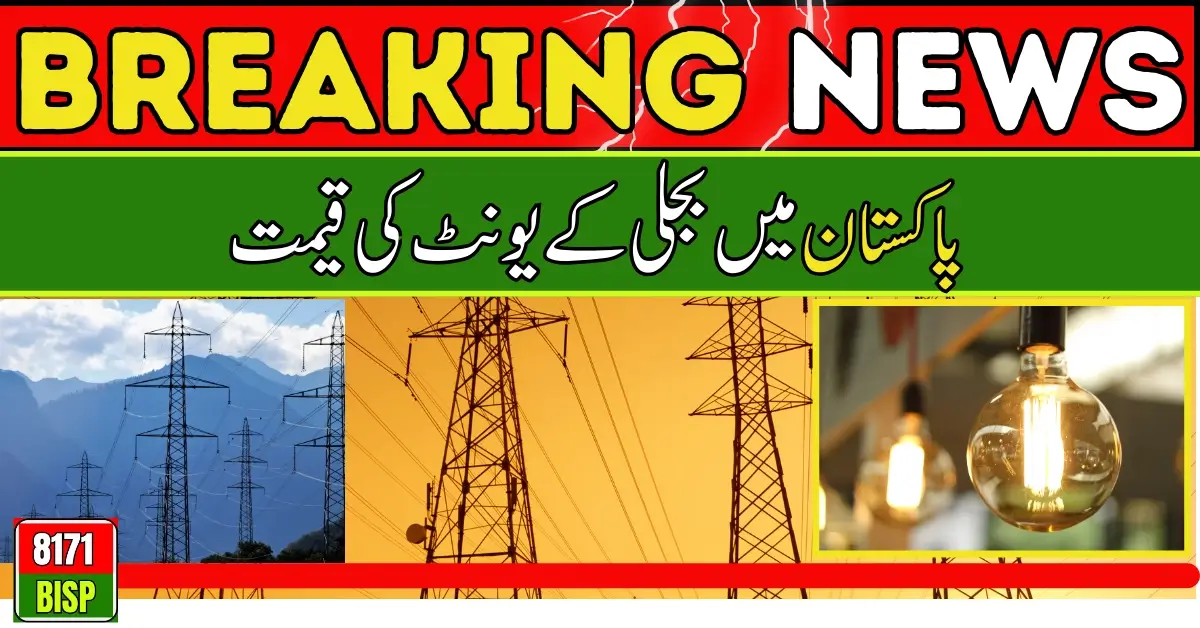Electricity prices in Pakistan are rising steadily. The cost per unit of electricity varies by province, with different rates for Punjab, Sindh, Balochistan, and KPK. Understanding these rates is crucial for managing your electricity bill.
Electricity Unit Price in Pakistan: 29 July 2024 2024 Update
Here’s the latest breakdown of electricity rates in Pakistan as of 29 July 2024 2024:
| Number of Units | Rate per Unit (KWH) |
|---|---|
| Below 50 | Rs. 5.95 |
| 1 to 100 | Rs. 23.59 |
| 101 to 200 | Rs. 30.10 |
| 201 to 300 | Rs. 34.26 |
| 301 to 400 | Rs. 39.15 |
| 401 to 500 | Rs. 41.36 |
| 501 to 600 | Rs. 42.78 |
| 601 to 700 | Rs. 43.92 |
| Above 700 | Rs. 48.84 |
Electricity Price Update for 29 July 2024 2024
The National Electric Power and Regulatory Authority (NEPRA) controls electricity supply and rates in Pakistan. NEPRA has recently increased electricity prices. This new structure impacts the overall cost, making it essential to stay updated.
Domestic and Commercial Rates
Electricity rates differ for domestic and commercial connections. Here are the current rates:
| Load Type | Rate per Unit (KWH) |
|---|---|
| Less than 5kW load | Rs. 38.80 |
| More than 5kW load | Rs. 40.26 |
List of Electricity Distribution Companies in Pakistan
There are several electric supply companies in Pakistan, each responsible for specific regions:
- Faisalabad Electric Supply Company (FESCO)
- Gujranwala Electric Power Company (GEPCO)
- Hazara Electric Supply Company (HAZECO)
- Hyderabad Electric Supply Company (HESCO)
- Islamabad Electric Supply Company (IESCO)
- Karachi Electric Supply Company (KESC)
- Lahore Electric Supply Company (LESCO)
- Multan Electric Power Company (MEPCO)
- Peshawar Electric Power Company (PESCO)
- Quetta Electric Supply Company (QESCO)
- Sukkur Electric Power Company (SEPCO)
- Tribal Electric Supply Company (TESCO)
Electricity Price Structure in Pakistan
Understanding the price structure is essential for managing your electricity bills:
- Electric Supply Incharge Companies: They set the unit rates.
- Meter Fare: Not applicable to everyone.
- Service Charges: Not applicable to everyone.
- Fuel Price Adjustment: 29 July 2024 vary.
- R-Surcharge, Surcharge, QTR Tariff ADJ/DMC: Additional charges set by the government.
- Government Duties: Include electricity duty, TV fee, General Sales Tax (GST), and radio fee.
How to Calculate Your Electricity Bill
Here’s a guide to calculating your electricity bill after a tariff increase:
- Base Tariff: Multiply the units used by the base tariff rate.
- Fuel Adjustment Charges (FAC): Add these charges if applicable.
- Taxes and Surcharges: Add government-imposed taxes and surcharges.
- Peak Hour Charges: If your usage falls during peak hours, multiply the units by the peak hour rate.
Example Calculation:
If you use 300 units in a month and 100 units are during peak hours:
- Base Tariff: 200 units x Rs. 20 = Rs. 4,000
- Fuel Adjustment Charges: Rs. 0 (no change in fuel prices)
- Tax & Surcharges: Rs. 4,000 x 0.2 = Rs. 800
- Peak Hour Charges: 50 units x (Rs. 30.69 – Rs. 20) = Rs. 534.69
- Total Bill: Rs. 4,000 + Rs. 0 + Rs. 800 + Rs. 534.69 = Rs. 5,334.69
So, your electricity bill for 29 July 2024 2024 would be Rs. 5,334.69.
FAQs
1. What are the current electricity rates in Pakistan?
The rates vary by usage, starting from Rs. 5.95 per unit for below 50 units to Rs. 48.84 per unit for above 700 units.
2. Who regulates electricity prices in Pakistan?
The National Electric Power and Regulatory Authority (NEPRA) regulates electricity prices.
3. How can I calculate my electricity bill?
Multiply your unit usage by the base tariff, add fuel adjustment charges, taxes, and peak hour charges if applicable.
4. Are there different rates for domestic and commercial connections?
Yes, domestic and commercial rates vary based on load and usage.
5. What additional charges might appear on my electricity bill?
Additional charges include service charges, fuel price adjustments, government duties, and surcharges.
Conclusion
Electricity rates in Pakistan have increased due to government regulations and inflation. This rise affects both domestic and commercial consumers, making it crucial to understand the new rates and calculate your bills accordingly. Keep visiting for the latest updates and information on electricity prices in Pakistan.
